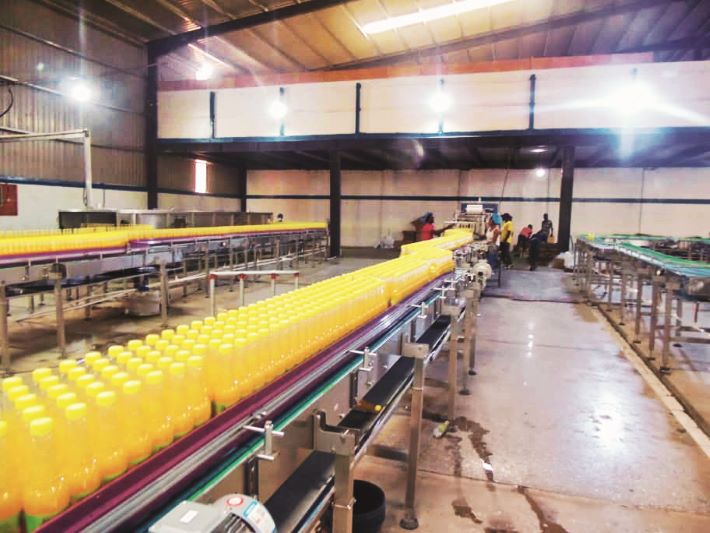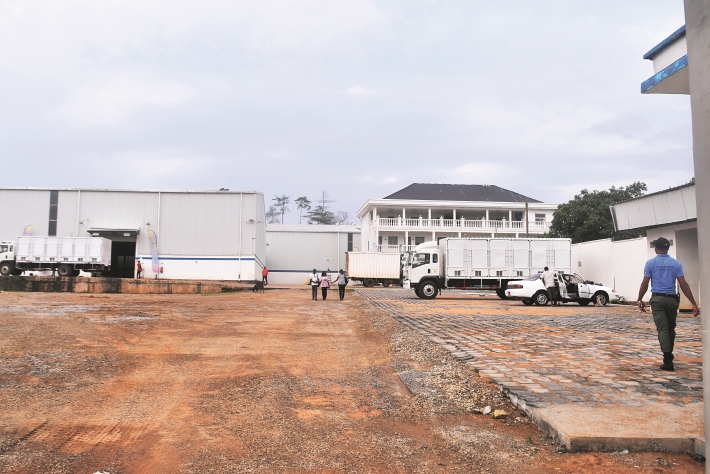|
||||||||||
| Home Nation World Business Opinion Lifestyle ChinAfrica Multimedia Columnists Documents Special Reports |
|
||||||||||
| Home Nation World Business Opinion Lifestyle ChinAfrica Multimedia Columnists Documents Special Reports |
| ChinAfrica |
| A Taste of Success |
| Chinese companies push the development of Cameroon’s agri-food sector |
| By FRANÇOIS ESSOMBA | VOL. 16 April 2024 ·2024-04-11 |

A bottling plant of Ultimate Sarl (COURTESY)
Cooperation between China and Cameroon has reached extraordinary heights over the past two decades, which has deepened both the diplomatic and economic ties. This mutually beneficial partnership has made China the leading buyer of Cameroonian products, with a market share of 25.8 percent in 2021, and the leading supplier, with a market share of 17.5 percent in 2020, according to data from the National Institute of Statistics of Cameroon.
China is also emerging as the leader in foreign investment in Cameroon, surpassing other countries in various sectors. Chinese investment, almost three times that of all other sources combined, is concentrated (80 percent) in essential infrastructure such as highways, ports, drinking water supply, and conventional and solar energy projects.
This profitable partnership has attracted Chinese companies to make long-term investments in Cameroon, particularly in the agri-food sector. A notable example is Ultimate Sarl, set up in 2023 by Chen Mingming, its chief executive officer. This company aims to produce, package and distribute soft drinks, natural mineral water and possibly biscuits.
Investing in Cameroon
Arriving in Cameroon in 2016, Chen first spent time carefully observing the local market. After the assessment, he decided to settle in Nomayos in Mbankomo district, near Yaoundé. There he built a large brewery complex, including a modern factory, a large warehouse for storage and elaborate buildings for administrative offices and housing for some of the company’s executives.
The success of Chen’s products did not take long to manifest itself, as the soft drinks produced by his company enjoyed remarkable popularity in the Cameroonian and Central African markets. This success is based on a commitment to providing high-quality consumer products at affordable prices, meeting the expectations of a clientele with limited purchasing power but high demand for quality.
Commenting on his decision to invest in Cameroon, Chen highlighted the country’s business potential and the facilitation offered by the Cameroonian authorities. “Cameroon is a fertile ground for investment, thanks to a state that effectively guides investors, with the support of the Promotions and Investments Agency and the Cameroonian administration in general,” explained the founder of Ultimate.

View of an Ultimate Sarl production plant (COURTESY)
Dynamic competition
Chen is not the only Chinese player in Cameroon’s dynamic agri-food sector. His company faces competition from U-fresh Company Ltd., another major Chinese player in the sector that has also carved out a significant share of the Cameroonian food market. Based in Douala, Cameroon’s economic capital, U-fresh has hired 80 percent of its staff locally, demonstrating its integration into the national economy. With a remarkable business strategy, U-fresh plays a key role in the Chinese food industry in Cameroon, specialising in the production and distribution of soft drinks and dairy products, including yoghurts in various types of packaging. The company offers a range of prices depending on the quantity and variety of its products.
U-fresh is part of U-fresh Food, a Chinese multinational present in more than 14 African countries and 22 countries worldwide. Since August 2016, it has launched two product lines in the Cameroonian market: U-fresh drinks and drinking milk under Lumière brand. “Our products are healthy, fresh, natural and comply with Cameroonian regulatory standards. There is no reason to question their quality, purity or safety because they are produced according to very strict quality standards,” assured William Ndop, sales and marketing manager at U-fresh.
The growing presence of Chinese agri-food companies in Cameroon also includes SANO, which was founded in Equatorial Guinea in 2009 and expanded to Cameroon in 2012. The company has offices in Douala and Yaoundé. Its core business is the extraction, production and distribution of SANO brand mineral water from pure underground springs.
The Chinese-owned company specialises in the production and marketing of a wide range of food products. Its portfolio includes mineral water, soft drinks, therapeutic and functional drinks, and fruit nectars. To ensure efficient production, the SANO plant is equipped with state-of-the-art facilities, including injection machines and automated packaging lines. These advanced technologies enable it to manage the entire bottling process autonomously. The company has more than 400 employees.
Local integration
Chinese entrepreneurs in Cameroon have managed to integrate remarkably well into the Cameroonian society. In addition to making significant investments to ensure the success of their businesses, they have also taken into account the social aspect of their activities, putting local communities at the centre of their business model. As a result, the establishment of Chinese industries in the country has created numerous employment opportunities and contributed significantly to the well-being of the local communities where these companies are based, particularly in the agri-food sector.
Christelle Nkoussa, administrative secretary at Ultimate, illustrates this dynamic perfectly: “The professional relationships I have with my Chinese superiors are very enriching. The arrival of Chinese investors in Cameroon plays a crucial role in our economy. In addition to their significant contribution to job creation, Chinese companies are actively involved in the development of our country. I urge my fellow Cameroonians to seize the opportunities for cooperation.”
The relationship between China and Cameroon was recently further strengthened by the visit of Chinese Vice Premier Liu Guozhong. From 17 to 18 January, Liu made a two-day visit to consolidate the deep friendship between the two nations, which reflects the excellent momentum of their cooperation since 1971. The visit not only underscored the solidity of Sino-Cameroonian relations, but also highlighted the diversity of their partnership.
While in Cameroon, the vice premier held a meeting with President Paul Biya, and also visited the new National Assembly building currently under construction. This project, funded by the Chinese government to the tune of around $120 million, embodies China’s tangible support for Cameroon’s infrastructure development and strengthens the ties of friendship and cooperation between the two countries.
| About Us | Contact Us | Advertise with Us | Subscribe |
| Copyright Beijing Review All rights reserved 京ICP备08005356号-5 京公网安备110102005860号 |